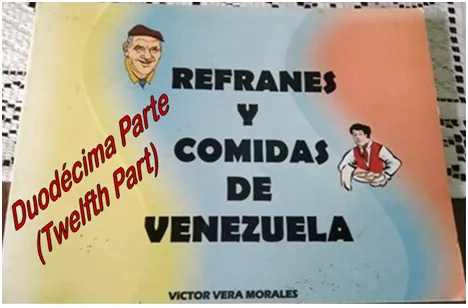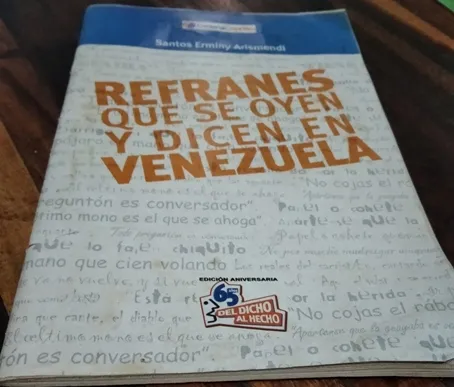Saludos nuevamente, espero hayan tenido un buen asueto de Carnaval, que haya sido útil para compartir con sus familiares y seres queridos, y para reforzar sus tradiciones. Como es costumbre, aquí les traigo otra entrega de mi seriado “Cinco sabios refranes venezolanos”, siendo esta la Décima Segunda Parte del mismo; y como siempre presento cinco de los dichos más comunes en mi país, Venezuela; los que extraigo del libro “Refranes que se oyen y dicen en Venezuela”, cuyo autor es Santos Erminy Arismendi, libro publicado por la Cadena Capriles en el año 2006, el cual venía encartado gratis en el periódico “Últimas Noticias”. Los análisis y comentarios son 100% de mi autoría. Al final de este post están los enlaces que les llevarán a las 11 primeras entregas.


Este refrán es equivalente al que dice “Váyase con su música para otra parte” , y se utiliza generalmente para alejar a una persona, para expresarle desagrado y largarla o correrla de un lugar.
Es un refrán que se utiliza de manera irónica para decir que una persona es una aprovechada, que comienza algo pero no lo termina, si no que se lo deja a otro para que lo culmine y se aprovecha del fruto de su esfuerzo.
Refrán que se utiliza para referirse a una persona que es mala y aprovechada, que tiene la capacidad de quitarle la comida a Pilatos, jajajaja, así será de mala y de astuta.
Es una frase que se emplea para resaltar lo extemporáneo o tardío de un asunto, lo que se hace ya pasado el tiempo; y esto se debe a que los buñuelos son unos dulces que se comen casi que de forma exclusiva en el período de Semana Santa, no después. Debo aclarar que los buñuelos se elaboran de una masa de yuca y queso, se fríen y luego se bañan con miel o melao de papelón, ¡son deliciosos!
Dicho que se emplea para decir que una persona no teme a hacer algo, ya sea esto una acción buena o mala, es decir, no tiene límites ni reparos para llevar a cabo algo.

<div class="text-justify> Greetings again, I hope you had a good Carnival break, which was useful to share with your family and loved ones, and to reinforce your traditions. As usual, here I bring you another installment of my series "Five wise Venezuelan sayings", this being the Twelfth Part of it; And as always I present five of the most common sayings in my country, Venezuela; those that I extract from the book "Sayings that are heard and said in Venezuela", whose author is Santos Erminy Arismendi, a book published by Cadena Capriles in 2006, which was inserted for free in the newspaper "Últimas Noticias". The analysis and comments are 100% my authorship. At the end of this post are the links that will take you to the first 11 deliveries.


This saying is equivalent to the one that says "Go elsewhere with your music" , and is generally used to release a person, to express displeasure and to throw them away or run them away from a place.
It is a saying that is used in an ironic way to say that a person is a lucrative person, that he begins something but does not finish it, if not that he leaves it to someone else to complete it and then takes advantage of the fruit of his effort.
A saying that is used to refer to a person who is bad, who has the ability to take food from Pilate, hahahaha, that's how bad and cunning it will be.
It is a phrase that is used to highlight how untimely or late a matter is, what is done after time; and this is because buñuelos are sweets that are eaten almost exclusively in the Easter period, not after. I must clarify that the fritters are made from a mass of yucca and cheese, they are fried and then bathed with honey or honeydew, they are delicious!
Said that it is used to say that a person is not afraid to do something, whether this is a good or bad action, that is, he has no limits or qualms to carry out something.

Dear readers, below I place the links of the first ten posts, in case you want to read them:
Víctor Vera Morales. (Agosto 2004). Refranes y Comidas de Venezuela. Editado por el Instituto Municipal de Publicaciones de la Alcaldía de Caracas.
Santos Erminy Arismendi. (2006). Refranes que se oyen y dicen en Venezuela. Cadena Capriles, Caracas. Venezuela.
- Fotos de mi autoría, tomada con un teléfono REDMI 8A, intervenida con WordArt / Photos of my authorship, taken with a REDMI 8A telephone, intervened with WordArt.
- Los diseños incluidos en esta publicación, han sido elaborados por mi persona con la aplicación CANVA / The designs included in this publication has been made by me with the CANVA application.
In the event that it is required to use the content or images of this post and my other publications, I would be grateful if my authorship (Fabiola Martínez) was made and the corresponding link was cited. Thank you.

 CommunityIIDiscord
CommunityIIDiscord